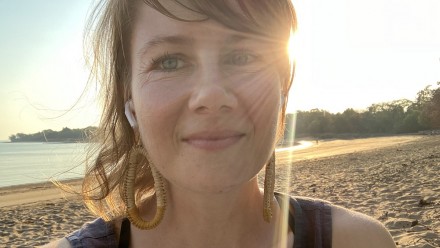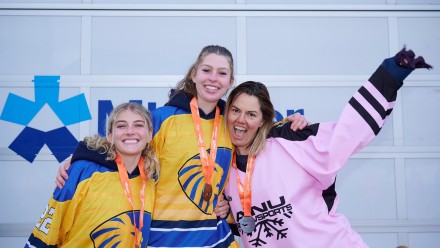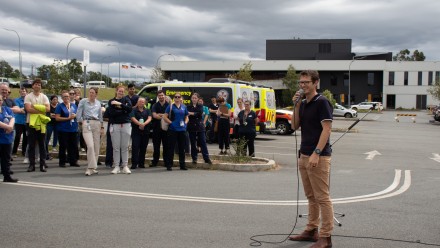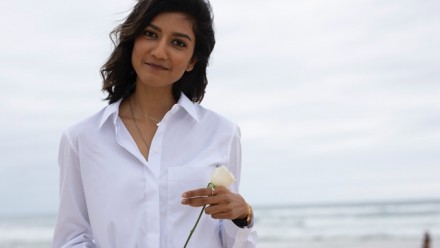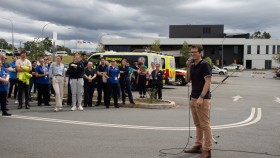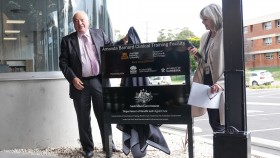On the other side
By Shabnam
My name is Shabnam, and I am an intern working in Australia. I am thrilled to share my story and how I ventured into the world of advocacy, advocating for ovarian cancer. It is so often forgotten that we, as humans, have the need to tell, to share our life experiences, which help others understand their own. Yet, it is something that demands bravery. Though I may seem stable in appearance, it took me exceptional courage to be here today, perhaps even more than the time when I jumped out of a helicopter 12,000 feet above the Swiss Alps. Now before I dive into it, please allow me to tell you a little bit more about myself.
I am originally from Mauritius, a small island off the eastern coast of Madagascar. Both my parents are medical doctors, and their work sparked my interest in medicine. I moved to Australia to fulfil my dream of becoming a doctor. Most people, when they think of their medical school experience, immediately recall the dreaded exams, long hours of study and the many sleepless nights. Some remember the life-long friendships they made. For me, it was rather a topsy-turvy experience, especially my clinical years in the context of a global pandemic. With the quick shift to online learning and disruption to clinical placement, loneliness and anxiety took a relentless toll on me. Years went by without being able to see my family as international borders remained close. Despite the onerous hurdles, I was one of many to be seen tossing the graduation cap as I concluded the Doctor of Medicine program. I subsequently kicked off my career as a junior doctor on the Gold Coast in early 2022.
Since the beginning of medical school, I dreamed of the day I would start practicing as a doctor. I was caught between trepidation as the workforce in healthcare was in crisis, and hope and optimism for my future as a doctor. It never crossed my mind that my career would be thrown into jeopardy so soon after starting work.
We often hear the saying that doctors are the worst patients. Maybe it’s because we attend to patients every day, we are so familiar with what it looks like to be sick, to be vulnerable, and to hear the fears of the ailing. Furthermore, we have unrealistic expectations of ourselves to be stronger. Sadly, I was one of them. Being a workaholic, my physical wellbeing was not a priority. To make matter worse, I was working in the Emergency Department at a time of rising COVID cases. As the pandemic fuelled a staff shortage, I felt the need to keep going. So, at the emergence of some vague symptoms, I brushed them off, telling myself “Just get over it”. Little did I know that my health was at stake. As three weeks went by, painkillers blunted the abdominal cramps, but ongoing inter-menstrual bleeding led to a growing feeling of disquiet. I finally went to see my GP on a day off and organised an ultrasound. The series of events which unfolded after this were quite fast, events which I did not foresee, and which prompted me to re-examine priorities in life.
I still vividly remember walking out of the Emergency Department after a night shift, racked by fatigue and checking my phone to find that I had been recalled by my GP for an “abnormal result”. A sudden feeling of panic engulfed me. In what felt like no time, I was referred to the gynecologist and booked in for surgery only a week later for the removal of a suspected ovarian cyst. As I lay in a cold hospital bed afterwards, the feeling of social isolation and the hindered conversation behind a new attire of face masks, were a sobering reminder of the impact of this enduring pandemic on patients. Barely able to fend for myself, my father moved to Australia for a few months as international borders opened at a surprisingly right time. Regardless, I remained positive.
At the time, I thought my situation was not dire since the ovarian lesion was likely benign, but I had to wait for the formal results. I was focused on getting back to work. At my follow up appointment a few days later, the words “Unfortunately, it’s not good news,” hit me with force. I was diagnosed with endometriosis and ovarian cancer. The latter two words completely changed my life. I cannot put into words my intense emotions as I tried to swallow the lump in my throat. That same day, I was seen by the gynae-oncologist and booked in for staging surgery to remove my left ovary and fallopian tube. Yet again, I was wheeled into another operating theatre, with hope being my sole possession. My heart pounding, I closed my eyes to the hinted melody of the ventilation machine.
After my staging surgery, weeks went by with no updates about my results and future management. Time appeared to stretch, and I felt stuck, stuck in the present experience, where everything seemed muffled. It would be a mere understatement saying I felt depressed. It was a gamut of feelings. Thomas Fuller wrote once “One cloud is enough to eclipse all the sun”, that one cloud for me was my diagnosis, a surprise that instantly changed me from a healthy to a sick person. I was scared that my diagnosis would become synonymous with my identity. In the midst of my lows, hope seemed far away. Wretched with despair, my father’s support acted as a buffer to my emotional upheaval. He reported back daily to others back in Mauritius who could not be here with me due to the pandemic. Gradually, I felt uplifted by the ongoing love and support I received from my family and friends, and from new friendships and individuals who have been in similar situations. I soon realised that I was not alone and found meaning from other people’s stories during this baffling time. I restarted work, which made life feel normal and kept me going as it was the one safe place where I was still seen as a doctor, rather than a patient. My patients gave me a sense of perspective, my parents reminded me daily to keep persevering and my faith comforted my fears in this dark time.
By the end of April, I was told that the results took longer than expected due to the rarity of the type of ovarian cancer which necessitated further opinions from other specialists and several multi-disciplinary medical team meetings. It was only at the start of May that some light was shed on my final diagnosis and future management. I was diagnosed with a mixed dysgerminoma and gonadoblastoma. My tumour had been excised completely during surgery. While I consider myself lucky as my cancer was picked at an early stage, the next twelve months for me are critical due to the high risk of recurrence. Being currently under clinical surveillance, I have slowly accepted that for the next ten years at least, my life will revolve around frequent blood tests, scans and endless appointments with my gynae-oncologist. In the case of future recurrence, chemotherapy will be the next step.
At first glance, it may seem like I got my happy ending. Yet, the pressing life decisions awaiting me and the uncertainty that the future holds are palpable. There is not one single day where I do not wake up, fearing that the cancer will return, fearing that I will need to take my right ovary out, fearing that I will not be able to conceive in the future. The fears are limitless, but I have to remind myself every day that the best of what we are lies in what we hope to be. I hope to remain in complete remission. I hope I will be able to have a family of my own and I hope that generations to come will benefit from an early detection test for ovarian cancer.
As I navigated through this harrowing diagnosis, part of me had this fierce desire to ‘do something’. For me that meant sharing my story, not only to help me heal and build self-acceptance but also to help others by spreading awareness about ovarian cancer. As both a doctor and as a woman with ovarian cancer, I wanted to use my voice more poignantly, to raise funds for future research for an early detection test and to enhance treatment options. I started reading more about advocacy groups and stories of women impacted by ovarian cancer. I reached out to the Ovarian Cancer Research Foundation and Ovarian Cancer Australia, realising that their vision and goals intersected with mine. I am looking forward to my future engagement with them with the aim of achieving something to mark my own individual response to the world.
Each one of us will experience life changing events in many ways. Regardless of what this may look like, it will leave one somehow uncertain about what to do next. Being diagnosed with ovarian cancer during the pandemic was for me my life-changing experience and that feeling when I first learned that I was sick, is still lingering deep inside. Now, while I’m a doctor by trade, I am far from being a gifted teller of tales. My story is not here to pull every string in your heart to make you cry, but I hope it will be heard and shared; I hope it will make each one of you reading this today realize that you are not alone in your vulnerabilities; and I hope it will assist with the raising of funds for the future of ovarian cancer.
Donate to Shabnam’s fundraiser for the Ovarian Cancer Research Foundation.





